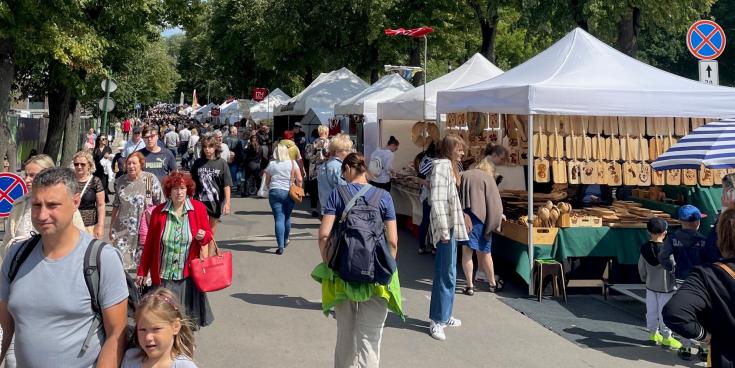Waste-free large events: Is it possible?
Imagine attending a large event not only with your phone in hand and wallet in your pocket but also equipped with a travel cup for drinks, reusable bags for purchases, and a picnic plate and utensils if you plan to buy lunch from street vendors. Is this realistic or impossible? The MINEV partner, KRWMC, asked large event organisers and waste managers in Lithuania.
- Difficulty in dish washing scheduling
Renaldas Gražys, one of the organisers of the Kaziukas fair, isn't inclined to rely solely on visitors' awareness. With about half a million people coming to the traditional fair from all over Lithuania and surrounding countries, some are accustomed to waste sorting while others are indifferent. Thus, it's necessary to create conditions for waste disposal and sorting.
"Although we've installed additional containers for mixed and packaging waste in the busiest areas for several years now, people are reluctant to use them; they immediately try to dispose of their garbage in permanent city garbage cans, which aren't suitable for sorting or mass events", said R. Gražys.
Another hope lies with the merchants, who will set up 1,400 stalls in Vilnius's old town during the fair. The fair organizers urge craftsmen and other traders to choose packaging for their products and food more responsibly, though they acknowledge that this is easier said than done. They experienced this firsthand when, a few years ago, they offered visitors reusable souvenir cups for drinks for a nominal fee, as is common at football matches in Germany or Christmas markets in Austria. However, the challenge lies in maintaining the hygiene of containers at all catering points in events of this magnitude. It would require collecting the cups multiple times, washing them, and returning them to the fair. Implementing such initiatives is easier in smaller events, Gražys shared.
- Success with edible drink cups
Planners of Lithuania's largest summer fair, Jūros šventės, identify disposable drinking cups as the most conspicuous waste. Maritime events coordinator, Robertas Petraitis, fondly recalls recent Christmas events in the city where edible drink cups were tested. After consuming cocoa or another hot beverage, the waffle cup could be eaten. Once disposed of, it quickly decomposed as food waste.
- Recycling isn't the primary goal
Event planners in the port city and the team at the Klaipėda Regional Waste Management Center (KRWMC) are gaining experience in reducing waste during large events through their participation in the MINEV project. Meetings of project partners have already been held in Malaga (Spain) and Bologna (Italy), with visits to Krakow (Poland) and Central Macedonia (Greece) planned.
"In Málaga, there's an initiative called Hilo Doble, which repurposes city event posters printed on moisture-resistant material. Cases for documents, glasses, phones, tablets are sewn from it. Some are purchased by the city municipality as business gifts and souvenirs. Partners from Krakow proudly use T-shirts made from recycled plastic at events.
All of this is important, as is ensuring smooth waste collection and sorting, but the most crucial aspect is striving to avoid waste altogether. 90% of waste generated during large holidays comprises packaging.
One idea that caterers could consider is disposable plates made from materials like buckwheat mass. Like it - eat it; if not, it will quickly decompose like food waste. The use of single-use cups at events is significantly reduced by a dense network of water stations, which provide the opportunity to refill one's own bottles.
However, individual initiatives are unlikely to lead to a breakthrough. State or self-governing institutions, issuing permits to organisers of large events, could prioritise sustainability", emphasised Ramunė Šličienė, deputy director of KRWMC.
- Waste avoidance is possible
A couple of months ago, the Parliament of the Republic of Lithuania registered proposals to limit single-use containers at mass events and beaches. According to Parliament member Kasparas Adomaitis, prohibiting individuals and legal entities from providing public catering services from selling or distributing disposable plastic products for serving food or drinks at mass events would encourage the creation of deposit systems and promote more sustainable consumption.
Valdonė Daugelaitė, co-founder of the environmental initiative "CupCup," has no doubt that this is possible. The organization aims to provide reusable cups to festivals, events, and café chains to transition to closed-loop business models and reduce waste.
"The largest event where we implemented this idea was the Šaknys festival, which attracted about 5,000 people. Reusable cups are sold with the drink and then returned for the same price at the bar. However, returning them isn't mandatory; there are always those who want to keep the reusable cup as a souvenir from the event".
